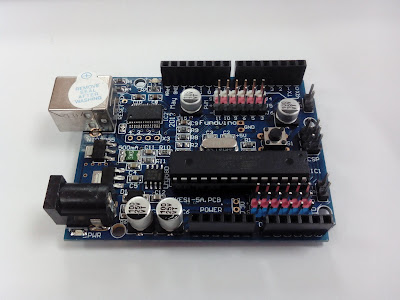DS18B20 TempSensor
- ทำอะไร
- ทำ ทำไม
- อุปกรณ์ที่ใช้
 |
| Arduino Duemilanove Extended |
 |
| DS18B20 Temperature |
 |
| ตัวต้านทาน 10K |
 |
| Bread Board |
- ขั้นตอนการทำ
- เขียนโปรแกรมให้ DS18B20 สามารถวัดอุณหภูมิได้
- เชื่อมต่อบอร์ด Arduino กับคอมพิวเตอร์และโหลดโปรแกรมที่เขียนเสร็จแล้วลงบอร์ด Arduino
- ต่อ DS18B20 เข้ากับบอร์ด Arduino ดังรูป
- คลิกที่รูปแว่นขยายในหน้าต่าง Arduino มุมขวาบน
- ดูผลการทำงาน หากขึ้น No more address ให้เช็คว่าต่อไฟหรือไม่? ต่อสาย Digital ถูกกต้องหรือไม่? หรือโปรแกรมกำหนด PINx ให้เช็คสายไฟว่าแน่นแล้ว
- ผลการทำงาน
- Source Code
#include <OneWire.h>
// OneWire DS18S20, DS18B20, DS1822 Temperature Example
// http://www.pjrc.com/teensy/td_libs_OneWire.html
// The DallasTemperature library can do all this work for you!
// http://milesburton.com/Dallas_Temperature_Control_Library
OneWire ds(10); // on pin 10
void setup(void) {
Serial.begin(9600);
}
void loop(void) {
byte i;
byte present = 0;
byte type_s;
byte data[12];
byte addr[8];
float celsius, fahrenheit;
if ( !ds.search(addr)) {
Serial.println("No more addresses.");
Serial.println();
ds.reset_search();
delay(250);
return;
}
Serial.print("ROM =");
for( i = 0; i < 8; i++) {
Serial.write(' ');
Serial.print(addr[i], HEX);
}
if (OneWire::crc8(addr, 7) != addr[7]) {
Serial.println("CRC is not valid!");
return;
}
Serial.println();
// the first ROM byte indicates which chip
switch (addr[0]) {
case 0x10:
Serial.println(" Chip = DS18S20"); // or old DS1820
type_s = 1;
break;
case 0x28:
Serial.println(" Chip = DS18B20");
type_s = 0;
break;
case 0x22:
Serial.println(" Chip = DS1822");
type_s = 0;
break;
default:
Serial.println("Device is not a DS18x20 family device.");
return;
}
ds.reset();
ds.select(addr);
ds.write(0x44,1); // start conversion, with parasite power on at the end
delay(1000); // maybe 750ms is enough, maybe not
// we might do a ds.depower() here, but the reset will take care of it.
present = ds.reset();
ds.select(addr);
ds.write(0xBE); // Read Scratchpad
Serial.print(" Data = ");
Serial.print(present,HEX);
Serial.print(" ");
for ( i = 0; i < 9; i++) { // we need 9 bytes
data[i] = ds.read();
Serial.print(data[i], HEX);
Serial.print(" ");
}
Serial.print(" CRC=");
Serial.print(OneWire::crc8(data, 8), HEX);
Serial.println();
// convert the data to actual temperature
unsigned int raw = (data[1] << 8) | data[0];
if (type_s) {
raw = raw << 3; // 9 bit resolution default
if (data[7] == 0x10) {
// count remain gives full 12 bit resolution
raw = (raw & 0xFFF0) + 12 - data[6];
}
} else {
byte cfg = (data[4] & 0x60);
if (cfg == 0x00) raw = raw << 3; // 9 bit resolution, 93.75 ms
else if (cfg == 0x20) raw = raw << 2; // 10 bit res, 187.5 ms
else if (cfg == 0x40) raw = raw << 1; // 11 bit res, 375 ms
// default is 12 bit resolution, 750 ms conversion time
}
celsius = (float)raw / 16.0;
fahrenheit = celsius * 1.8 + 32.0;
Serial.print(" Temperature = ");
Serial.print(celsius);
Serial.print(" Celsius, ");
Serial.print(fahrenheit);
Serial.println(" Fahrenheit");
}














